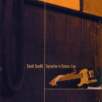This subject comes up a lot. It's a question in which many Berklee students
hear different answers. The question? "If I learn other peoples solos or listen
to other people's music, will it ruin my own creativity?"
Some experts argue that it will ruin your voice or make you a copy cat,
void of your own style. Some people I respect share this view. And, depending
on who you are and where you are in your development, this statement might be
true.
I heard Wayne Krantz give a master class the other day and he said, "I don't
really listen to music. I'm kind of a sponge and would end up imitating what
I heard." For Wayne, I can see his point. He definitly has a unique sound and
approach. He's really onto something and for him, this works. But, we should
remember, this is where Wayne is now. I am sure early on he did some imitating. After all, he was on the Steely Dan tour and has been a working musician for many years. If he played totally obscure, he wouldn't be invited to play as
often.
To work, you need to be able to play styles. If someone offers you $300 to
play a function with a smokin' band, you better know some tunes and how to play
the style. If a Singer/Songwriter wants you to play on their tour or CD, you
better know how to play in that setting. If a producer wants you to play a
track on a song, you better understand what makes the songs work with whatever
instrument you play. I am someone that wanted to gig all the time and not have a
day job. This involved learning style and imitating. This doesn't mean you
lack style or a voice. You can separate the two and work on your own stuff
outside of the working world. Plus, you can be tasteful in all the settings but add
your own flavor in the working world.
I have also heard a great player (who will go unnamed) say, "Why would you
learn someone else's solo? You'll just play those licks over and over and be an
imitator."
This idea may have worked for some great players. But, it might be a poor way
to learn music for many (especially if you are just learning a style). I'm an
example of someone that listens and transcribes a lot. Sure, I haven't
reinvented the wheel. It's my goal to play great music and have a unique voice, but
not to "reinvent the wheel." It's also hard to claim you have no influences.
We all hear music and are influenced by people we jam with and perform with
and any CDs we may have heard.
Bill Evans, in my opinion, is one of the greatest musicians of the 20th
century. He certainly had a very unique sound and touch. He still influences
countless musicians even 24 years after his death. He once said "...I had eleven
piano students, and I would say eight of them didn't even want to know about
chords or anything - they didn't even want to do anything that anybody had ever
done, because they didn't want to be imitators. Well, of course, this is pretty
naíve."
Some of my own examples - My time feel was (and still is) greatly enhanced by
transcribing and playing with Sonny Rollins, Herbie Hancock, Wes Montgomery
and Charlie Parker(and other) records. Matching the groove of those players
opened my time up. It was a lot of work to understand that way of playing eight
notes, quarter notes behind the beat-especially coming from a rock background.
There is no way to discuss this concept. You have to hear it. It's a feel and
not a math equation.
Speaking of time, I consider Herbie Hancock to have some of the best 'time'
out there. Plus, a lot of the stuff he plays makes me hear time in a new way.
I transcribed a bunch of his solos and played guitar to the CDs note for note.
It opened a new world of phrasing. From there, I would write my own solos
with my own rhythmic ideas (inspired by Herbie) and develop it that way. I still
work on my time and phrasing like this.
When I wanted my lines to be more 'angular'-or, have bigger intervals- I
transcribed Chick Corea and McCoy Tyner solos. I still do this. I check out the
devices they use and try to use those concepts in other situations. Plus, I
needed the 'chops' to play bigger intervals on guitar. The solos serve as 'pieces' to develop the intervals.
To wrap it up, listening to Hendrix really helped my vibrato, listening and
coping James Brown and Meters stuff really helped my funk vocabulary and
groove, listening to pop records really helped me learn how to play texture. Once I
listen and learn I sit down and try to make it mine. I have a lot of
influences from many different genres. Do I sound like one particular player? Does
this mean I can't come up with my own 'stuff'? Of course not! And, I love music
deeply. I would be devastated if I couldn't listen to it!
Bill Evans said, "First of all, I never strive for identity. That's something
that just has happened automatically as a result, I think, of just putting
things together, tearing things apart and putting it together my own way, and
somehow I guess the individual comes through eventually."
Scott Tarulli is a guitarist and Berklee College of Music instructor whose all instrumental quartet plays music as diverse as the frontman's playing.
From aggressive jazz/funk to textural ballads, the band plays music for all seasons.
His latest instrumental CD is entitled "September In Boston: Live".
